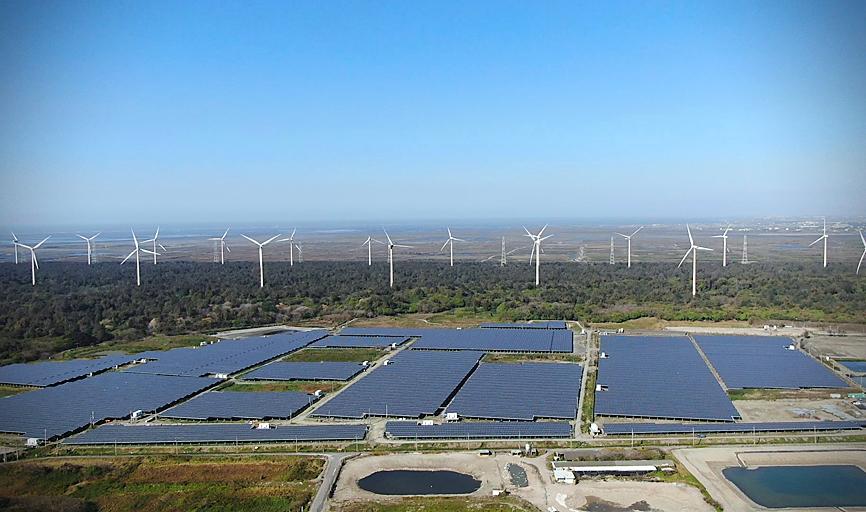Solar cell and module maker Motech Industries Inc (茂迪) yesterday said it plans to invest NT$1.5 billion (US$53.89 million) to expand production, with NT$400 million earmarked for high-efficiency next-generation solar cell capacity expansion.
The firm’s board of directors has approved the capital expenditure, the largest in five years, amid strong demand for the company’s tunnel oxide passivated contact (TOPCon) cells, Motech Industries president Fred Yeh (葉正賢) said.
“As photovoltaic systems integrator companies become more educated about the benefits of TOPCon solar cells, we are seeing strong demand,” Yeh said. “Orders are backed up into the second quarter of 2022.”

Photo: Chan Shih-hung, Taipei Times
“The next generation of TOPCon solar cell technology can raise the conversion rate to more than 22 percent, meaning that costs can be lowered by 6 to 8 percent,” he said.
Motech is expanding capacity from 15 megawatts (MW) to 200MW to satisfy demand and expand sales, he said.
“The next generation of batteries is 14.6 percent more efficient than previous [generations] and will produce more power, even under cloudy conditions,” Yeh said.
From the rest of the money, NT$1 billion is to go toward building more solar cell systems, while NT$100 million is to be invested in aquavoltaics, which combine eel and shrimp farms with solar photovoltaic arrays to get the most out of limited space, he said.
The company is new to aquavoltaics, Yeh said.
There is 30MW of capacity under development, which should join the grid “within the next year,” he said.
The beginning of the end is in sight for a parts shortage crisis that has plagued the tech sector this year amid supply chain bottlenecks and logistics logjams, Yeh said.
“Revenue and costs for Motech will peak [this] quarter, but the worst of the parts crisis is over,” he said.
Yeh said that he expects strong demand for Motech Industries’ solar cells to continue well into the second and third quarter of next year.

CHIP RACE: Three years of overbroad export controls drove foreign competitors to pursue their own AI chips, and ‘cost US taxpayers billions of dollars,’ Nvidia said China has figured out the US strategy for allowing it to buy Nvidia Corp’s H200s and is rejecting the artificial intelligence (AI) chip in favor of domestically developed semiconductors, White House AI adviser David Sacks said, citing news reports. US President Donald Trump on Monday said that he would allow shipments of Nvidia’s H200 chips to China, part of an administration effort backed by Sacks to challenge Chinese tech champions such as Huawei Technologies Co (華為) by bringing US competition to their home market. On Friday, Sacks signaled that he was uncertain about whether that approach would work. “They’re rejecting our chips,” Sacks

Taiwan’s long-term economic competitiveness will hinge not only on national champions like Taiwan Semiconductor Manufacturing Co. (TSMC, 台積電) but also on the widespread adoption of artificial intelligence (AI) and other emerging technologies, a US-based scholar has said. At a lecture in Taipei on Tuesday, Jeffrey Ding, assistant professor of political science at the George Washington University and author of "Technology and the Rise of Great Powers," argued that historical experience shows that general-purpose technologies (GPTs) — such as electricity, computers and now AI — shape long-term economic advantages through their diffusion across the broader economy. "What really matters is not who pioneers

TAIWAN VALUE CHAIN: Foxtron is to fully own Luxgen following the transaction and it plans to launch a new electric model, the Foxtron Bria, in Taiwan next year Yulon Motor Co (裕隆汽車) yesterday said that its board of directors approved the disposal of its electric vehicle (EV) unit, Luxgen Motor Co (納智捷汽車), to Foxtron Vehicle Technologies Co (鴻華先進) for NT$787.6 million (US$24.98 million). Foxtron, a half-half joint venture between Yulon affiliate Hua-Chuang Automobile Information Technical Center Co (華創車電) and Hon Hai Precision Industry Co (鴻海精密), expects to wrap up the deal in the first quarter of next year. Foxtron would fully own Luxgen following the transaction, including five car distributing companies, outlets and all employees. The deal is subject to the approval of the Fair Trade Commission, Foxtron said. “Foxtron will be

In a high-security Shenzhen laboratory, Chinese scientists have built what Washington has spent years trying to prevent: a prototype of a machine capable of producing the cutting-edge semiconductor chips that power artificial intelligence (AI), smartphones and weapons central to Western military dominance, Reuters has learned. Completed early this year and undergoing testing, the prototype fills nearly an entire factory floor. It was built by a team of former engineers from Dutch semiconductor giant ASML who reverse-engineered the company’s extreme ultraviolet lithography (EUV) machines, according to two people with knowledge of the project. EUV machines sit at the heart of a technological Cold